Publications
A collection of my publications can be found here.
2025
-
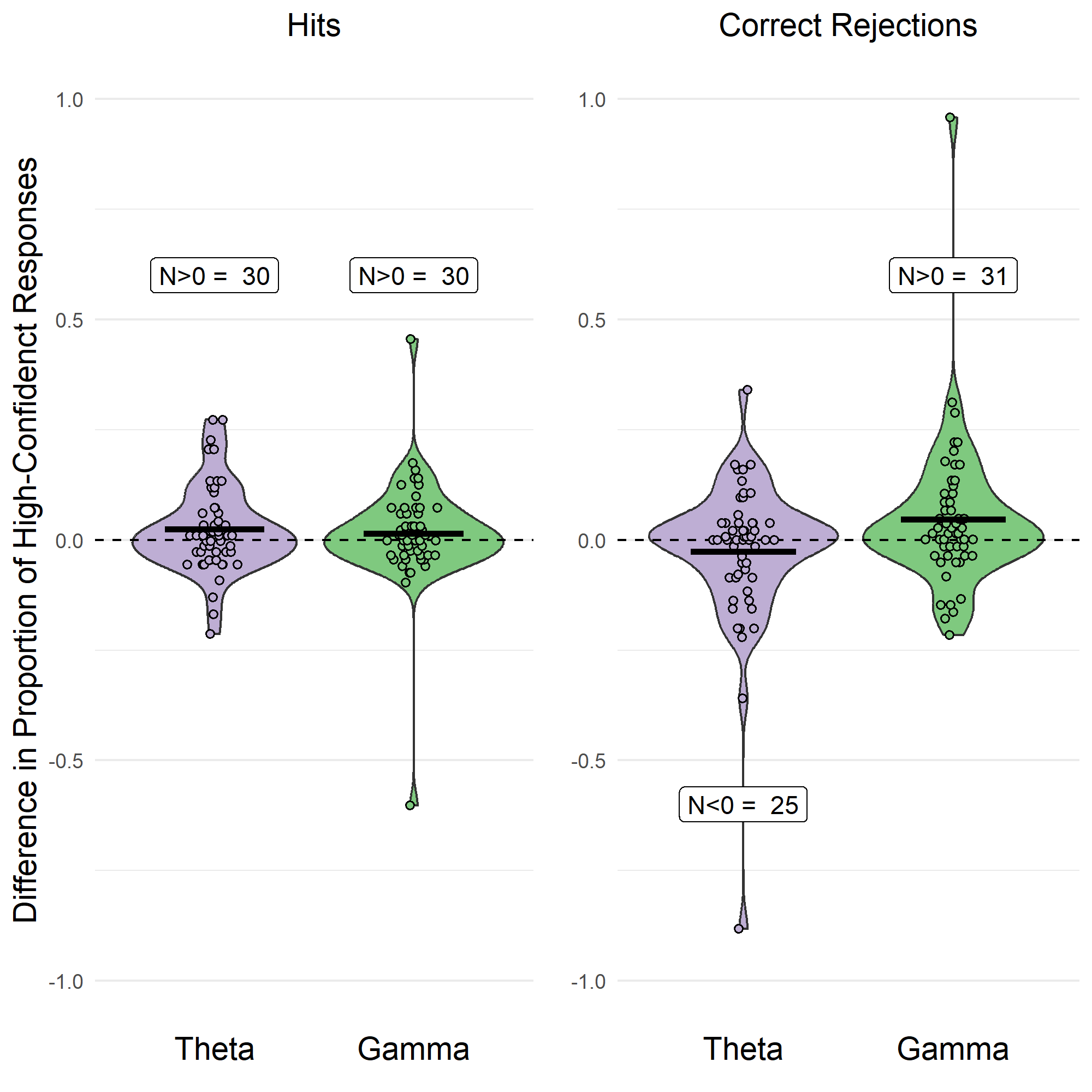 Utilizing tACS to enhance memory confidence and EEG to predict individual differences in brain stimulation efficacySyanah C Wynn, Tom R. Marshall, and Erika NyhusImaging Neuroscience, 2025
Utilizing tACS to enhance memory confidence and EEG to predict individual differences in brain stimulation efficacySyanah C Wynn, Tom R. Marshall, and Erika NyhusImaging Neuroscience, 2025The information transfer necessary for successful memory retrieval is believed to be mediated by theta and gamma oscillations. These oscillations have been linked to memory processes in electrophysiological studies, which were correlational in nature. In the current study, we used transcranial alternating current stimulation (tACS) to externally modulate brain oscillations to examine its direct effects on memory performance. Participants received sham, theta (4 Hz), and gamma (50 Hz) tACS over frontoparietal regions while retrieving information in a source memory paradigm. Linear regression models were used to investigate the direct effects of oscillatory noninvasive brain stimulation (NIBS) on memory accuracy and confidence. Our results indicate that both theta and gamma tACS altered memory confidence. Specifically, theta tACS seemed to lower the threshold for confidence in retrieved information, while gamma tACS appeared to alter the memory confidence bias. Furthermore, the individual differences in tACS effects could be predicted from electroencephalogram (EEG) measures recorded prior to stimulation, suggesting that EEG could be a useful tool for predicting individual variability in the efficacy of NIBS.
2024
-
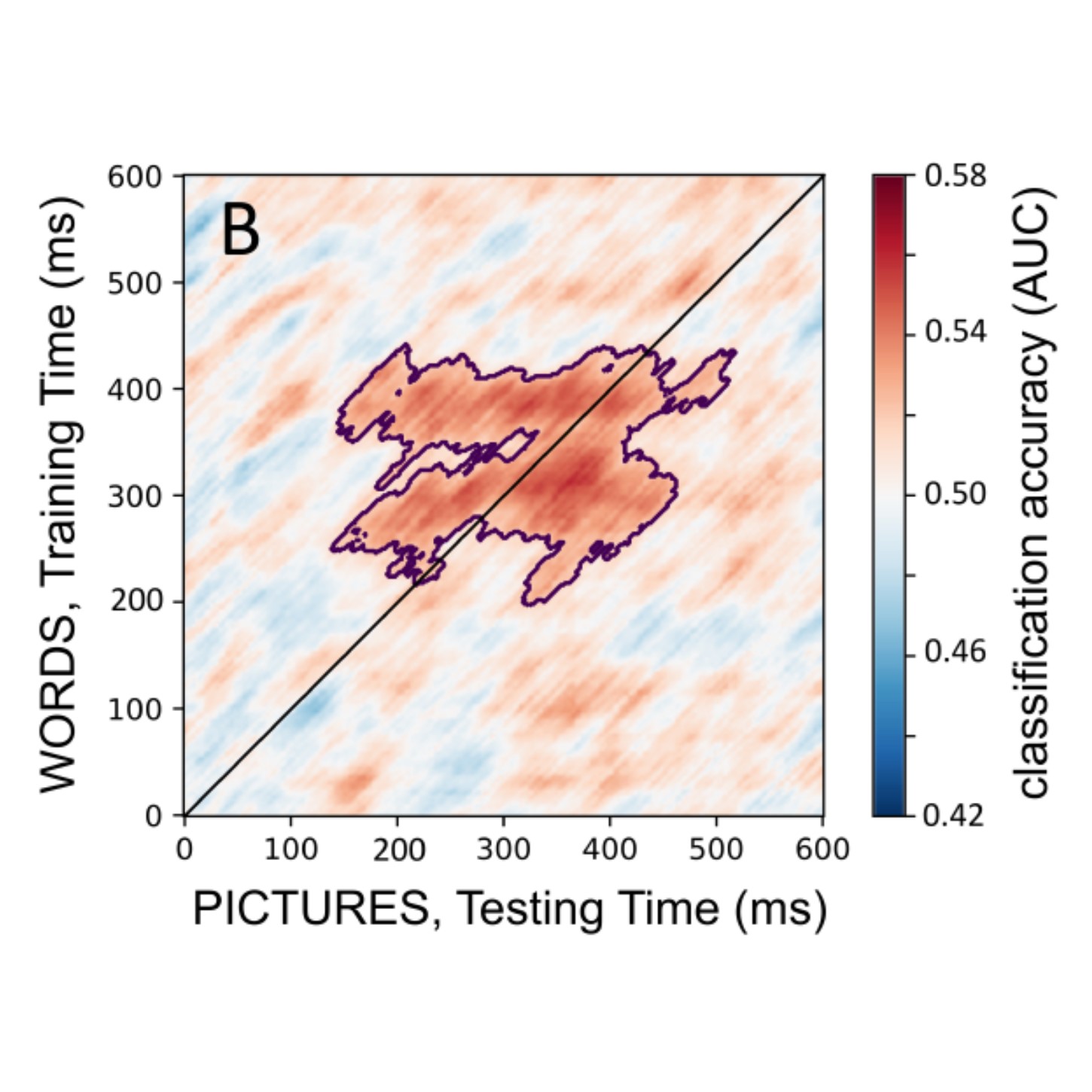 Spatiotemporal Properties of Common Semantic Categories for Words and PicturesYulia Bezsudnova, Andrew J Quinn, Syanah C Wynn, and Ole JensenJournal of Cognitive Neuroscience, 2024
Spatiotemporal Properties of Common Semantic Categories for Words and PicturesYulia Bezsudnova, Andrew J Quinn, Syanah C Wynn, and Ole JensenJournal of Cognitive Neuroscience, 2024The timing of semantic processing during object recognition in the brain is a topic of ongoing discussion. One way of addressing this question is by applying multivariate pattern analysis to human electrophysiological responses to object images of different semantic categories. However, although multivariate pattern analysis can reveal whether neuronal activity patterns are distinct for different stimulus categories, concerns remain on whether low-level visual features also contribute to the classification results. To circumvent this issue, we applied a cross-decoding approach to magnetoencephalography data from stimuli from two different modalities: images and their corresponding written words. We employed items from three categories and presented them in a randomized order. We show that if the classifier is trained on words, pictures are classified between 150 and 430 msec after stimulus onset, and when training on pictures, words are classified between 225 and 430 msec. The topographical map, identified using a searchlight approach for cross-modal activation in both directions, showed left lateralization, confirming the involvement of linguistic representations. These results point to semantic activation of pictorial stimuli occurring at ≈150 msec, whereas for words, the semantic activation occurs at ≈230 msec.
-
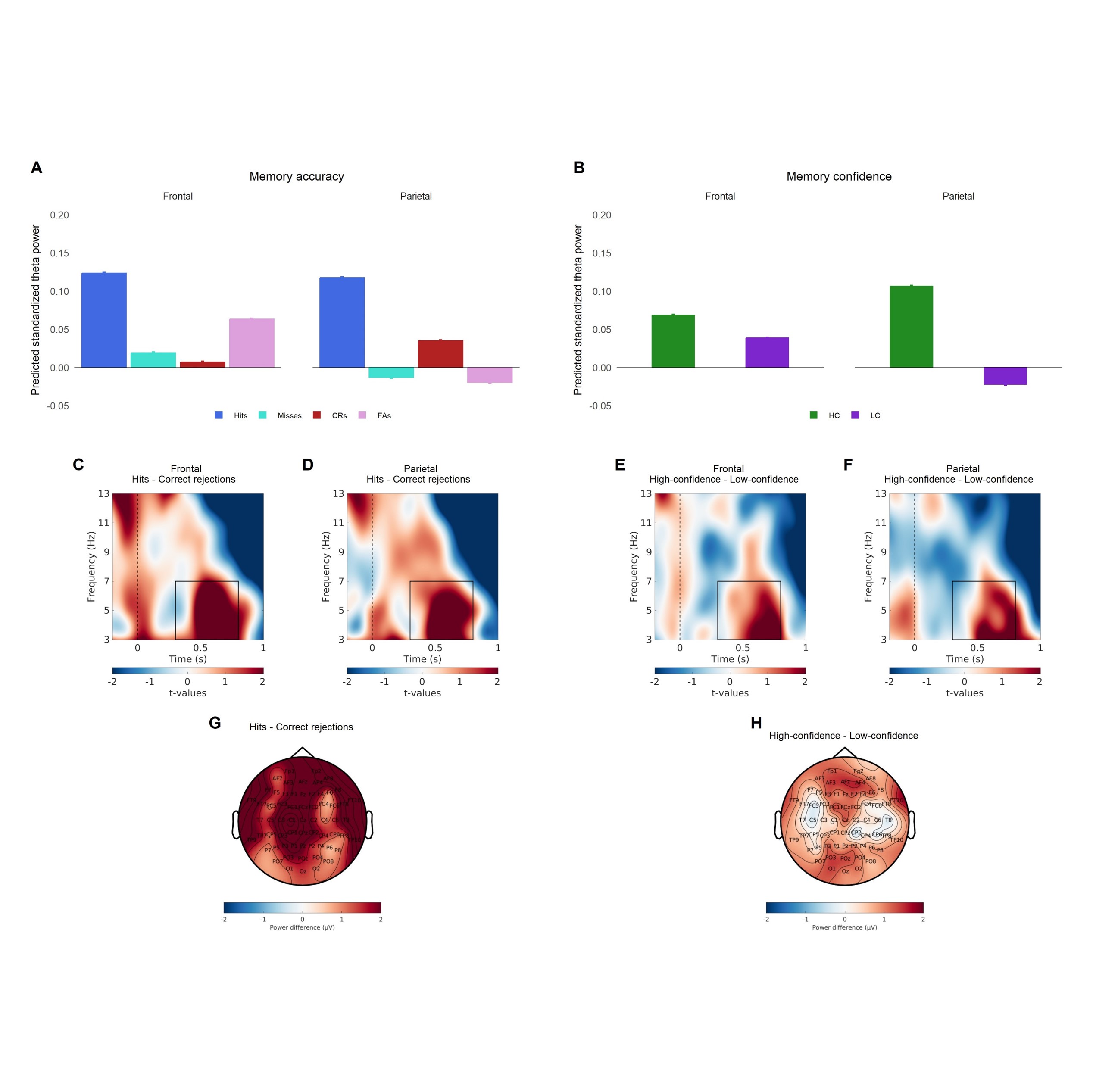 The role of theta and gamma oscillations in item memory, source memory, and memory confidenceSyanah C Wynn, Christopher D Townsend, and Erika NyhusPsychophysiology, 2024
The role of theta and gamma oscillations in item memory, source memory, and memory confidenceSyanah C Wynn, Christopher D Townsend, and Erika NyhusPsychophysiology, 2024Theta and gamma oscillations have been linked to episodic memory processes in various studies. Both oscillations seem to be vital for processes guided by the medial temporal lobe, such as the retrieval of information from memory. While theta oscillations increase with successful memory, it is unclear what the unique contribution of theta is to various subcomponents of memory. On the other hand, memory-related gamma oscillations have been mainly reported in the hippocampus, leaving the role of neocortical gamma in memory underexplored. In this study, we investigated how unique variability in memory accuracy and memory confidence contributes to fluctuations in theta and gamma power. To this end, we recorded EEG from 54 participants while they performed a source memory task. From this task we obtained their item memory accuracy, source memory accuracy, item memory confidence, and source memory confidence. These behavioral measures were put in a trial-by-trial linear mixed effects model to uncover their unique contribution to the oscillatory power in frontal and parietal regions. Our results are in line with the involvement of theta oscillations in both memory accuracy and confidence, but seem to indicate a main role for theta oscillations in memory-related confidence. In addition, we found that gamma oscillations play various roles in memory processing, dependent on brain region.
2022
-
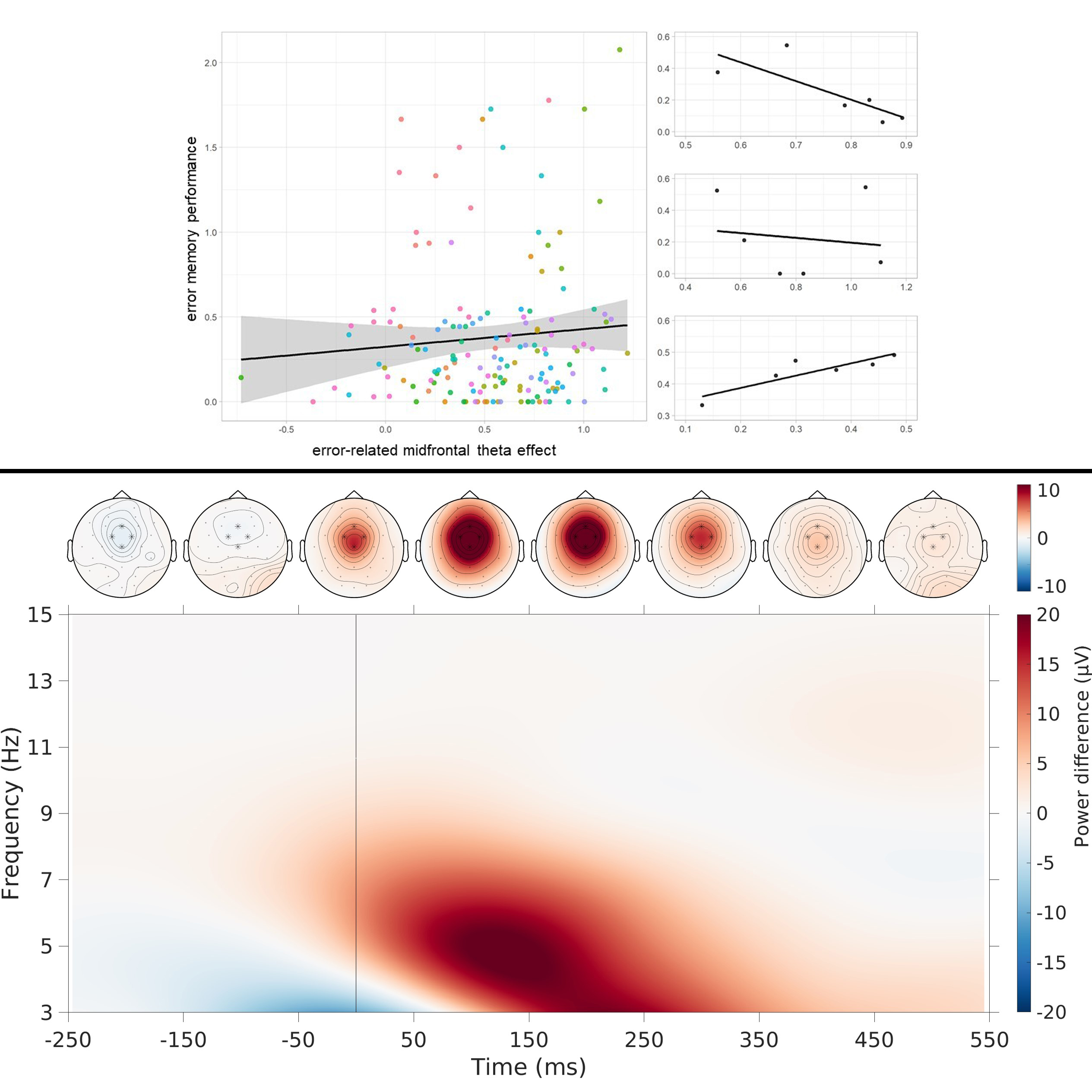 Midfrontal theta is associated with errors, but no evidence for a link with error-related memoryXiaochen Y Zheng, and Syanah C WynnNeuroimage: Reports, 2022
Midfrontal theta is associated with errors, but no evidence for a link with error-related memoryXiaochen Y Zheng, and Syanah C WynnNeuroimage: Reports, 2022Midfrontal theta is widely observed in situations with increased demand for cognitive control, such as monitoring response errors. It also plays an important role in the cognitive control involved in memory, supporting processes like the binding of single items into a memory representation or encoding contextual information. In the current study, we explored the link between midfrontal theta and error-related memory. To this end, we recorded EEG from 31 participants while they performed a modified flanker task. Their memory for the errors made during the task was assessed after each experimental block, and its relationship with error-related midfrontal theta effects was investigated. We have replicated the error-related increase in midfrontal theta power, reported in previous literature. However, this error-related theta effect could not predict subsequent memory of the committed errors. Our findings add to a growing literature on the prefrontal cortex-guided control process in error monitoring and memory.
-
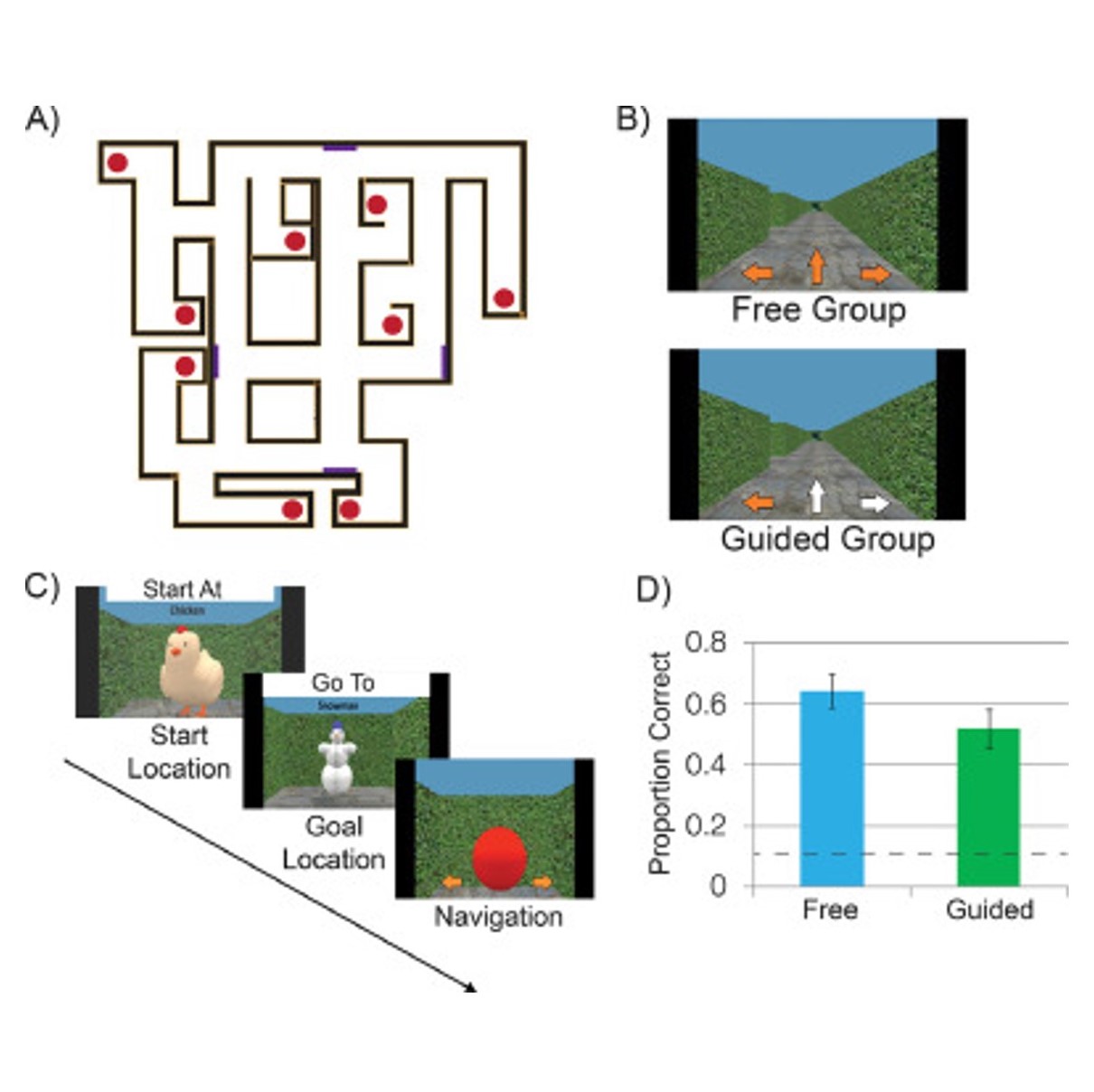 Theta oscillations support active exploration in human spatial navigationElizabeth R Chrastil, Caroline Rice, Mathias Goncalves, Kylie N Moore, Syanah C Wynn, Chantal E Stern, and 1 more authorNeuroImage, 2022
Theta oscillations support active exploration in human spatial navigationElizabeth R Chrastil, Caroline Rice, Mathias Goncalves, Kylie N Moore, Syanah C Wynn, Chantal E Stern, and 1 more authorNeuroImage, 2022Active navigation seems to yield better spatial knowledge than passive navigation, but it is unclear how active decision-making influences learning and memory. Here, we examined the contributions of theta oscillations to memory-related exploration while testing theories about how they contribute to active learning. Using electroencephalography (EEG), we tested individuals on a maze-learning task in which they made discrete decisions about where to explore at each choice point in the maze. Half the participants were free to make active decisions at each choice point, and the other half passively explored by selecting a marked choice (matched to active exploration) at each intersection. Critically, all decisions were made when stationary, decoupling the active decision-making process from movement and speed factors, which is another prominent potential role for theta oscillations. Participants were then tested on their knowledge of the maze by traveling from object A to object B within the maze. Results show an advantage for active decision-making during learning and indicate that the active group had greater theta power during choice points in exploration, particularly in midfrontal channels. These findings demonstrate that active exploration is associated with theta oscillations during human spatial navigation, and that these oscillations are not exclusively related to movement or speed. Results demonstrating increased theta oscillations in prefrontal regions suggest communication with the hippocampus and integration of new information into memory. We also found evidence for alpha oscillations during active navigation, suggesting a role for attention as well. This study finds support for a general mnemonic role for theta oscillations during navigational learning.
-
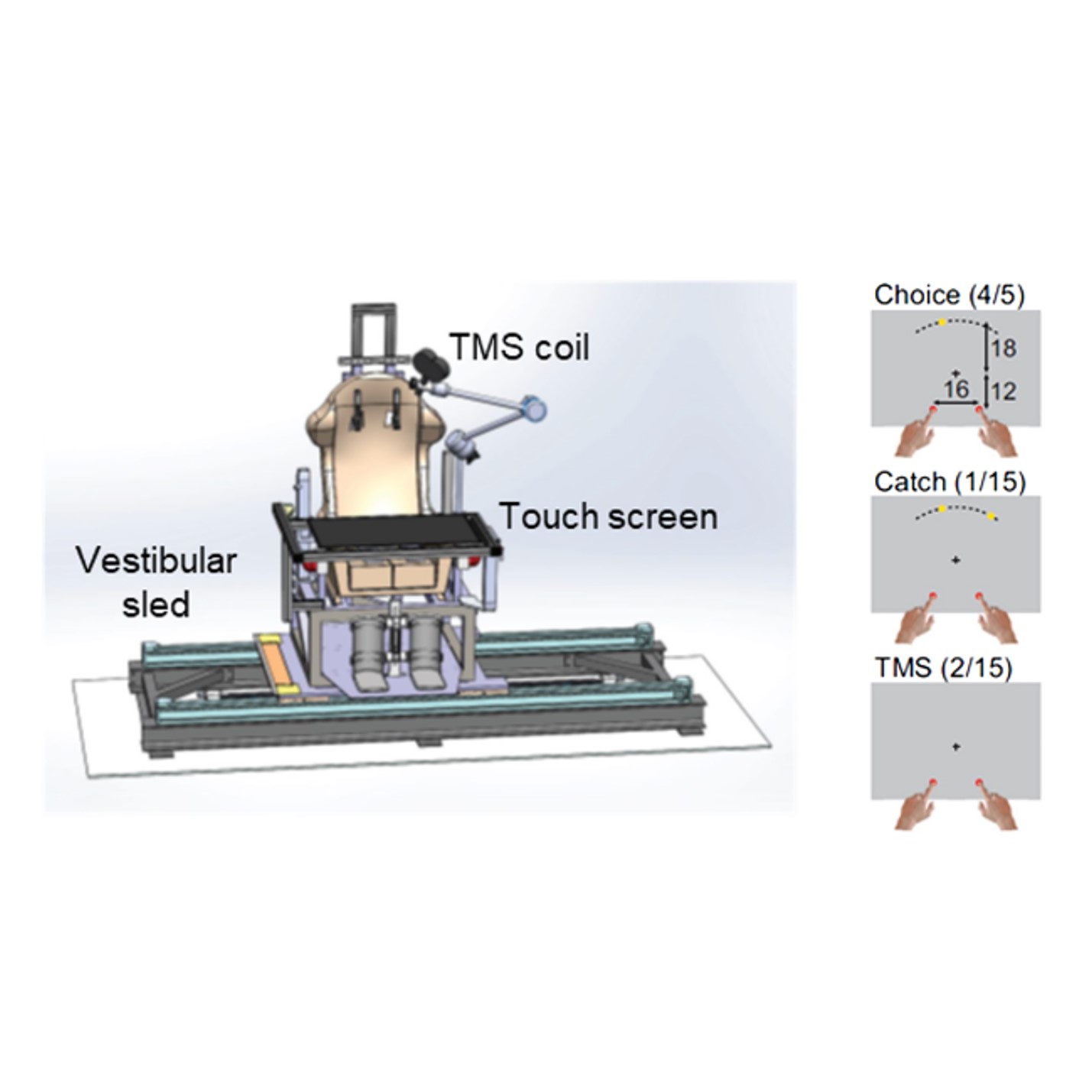 Assessing corticospinal excitability and reaching hand choice during whole-body motionLeonie Oostwoud Wijdenes, Syanah C Wynn, Béla S Roesink, Dennis JLG Schutter, Luc PJ Selen, and W Pieter MedendorpJournal of Neurophysiology, 2022
Assessing corticospinal excitability and reaching hand choice during whole-body motionLeonie Oostwoud Wijdenes, Syanah C Wynn, Béla S Roesink, Dennis JLG Schutter, Luc PJ Selen, and W Pieter MedendorpJournal of Neurophysiology, 2022Behavioral studies have shown that humans account for inertial acceleration in their decisions of hand choice when reaching during body motion. Physiologically, it is unclear at what stage of movement preparation information about body motion is integrated in the process of hand selection. Here, we addressed this question by applying transcranial magnetic stimulation over left motor cortex (M1) of human participants who performed a preferential reach task while they were sinusoidally translated on a linear motion platform. If M1 only represents a read-out of the final hand choice, we expect the body motion not to affect the motor-evoked potential (MEP) amplitude. If body motion biases the hand selection process prior to target onset, we expect corticospinal excitability to be influenced by the phase of the motion, with larger MEP amplitudes for phases that show a bias to using the right hand. Behavioral results replicate our earlier findings of a sinusoidal modulation of hand choice bias with motion phase. MEP amplitudes also show a sinusoidal modulation with motion phase, suggesting that body motion influences corticospinal excitability which may ultimately reflect changes of hand preference. The modulation being present prior to target onset suggests that competition between hands is represented throughout the corticospinal tract. Its phase relationship with the motion profile indicates that other processes after target onset take up time until the hand selection process has been completely resolved, and the reach is initiated.
-
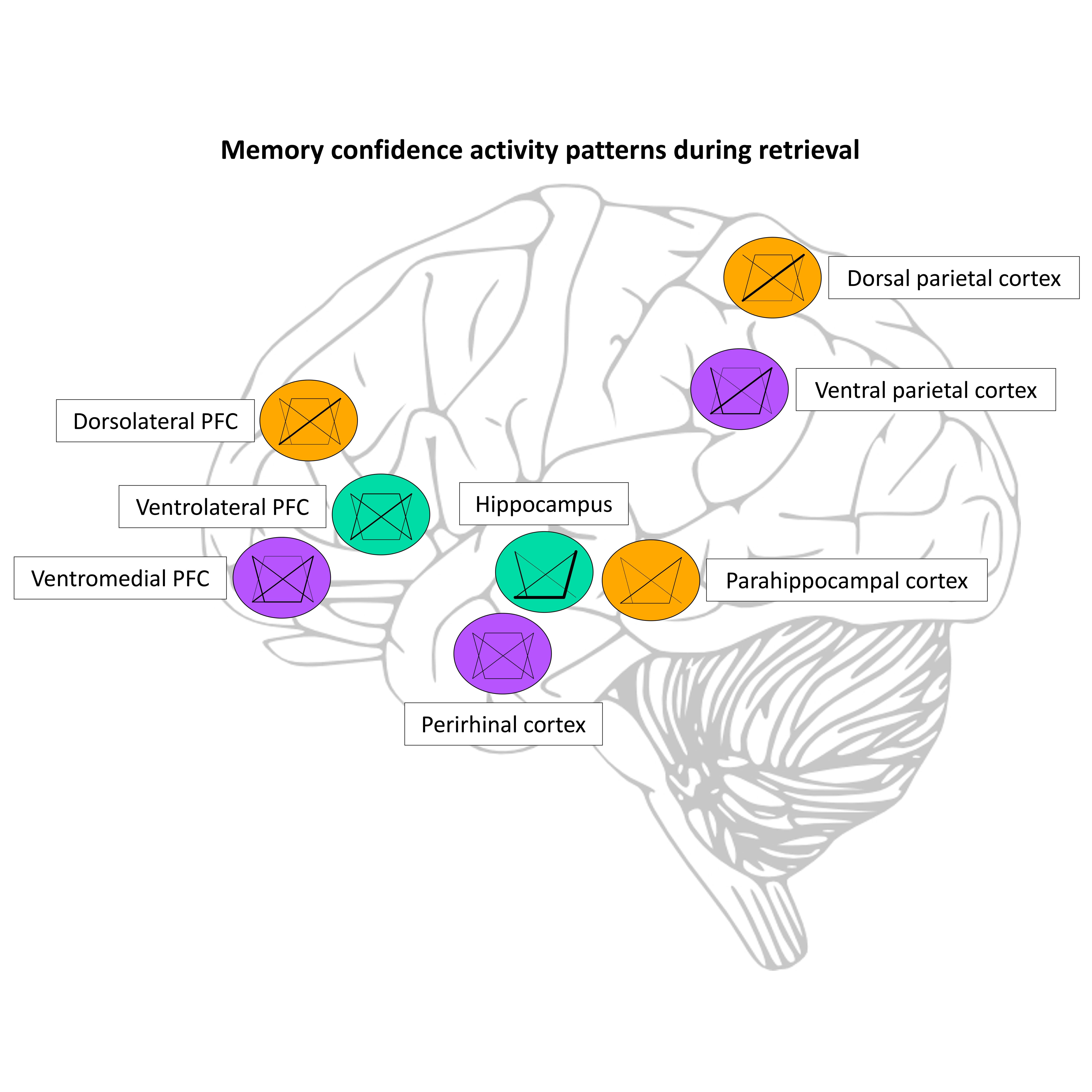 Brain activity patterns underlying memory confidenceSyanah C Wynn, and Erika NyhusEuropean Journal of Neuroscience, 2022
Brain activity patterns underlying memory confidenceSyanah C Wynn, and Erika NyhusEuropean Journal of Neuroscience, 2022The primary aim of this review is to examine the brain activity patterns that are related to subjectively perceived memory confidence. We focus on the main brain regions involved in episodic memory: the medial temporal lobe (MTL), prefrontal cortex (PFC), and posterior parietal cortex (PPC), and relate activity in their subregions to memory confidence. How this brain activity in both the encoding and retrieval phase is related to (subsequent) memory confidence ratings will be discussed. Specifically, encoding related activity in MTL regions and ventrolateral PFC mainly shows a positive linear increase with subsequent memory confidence, while dorsolateral and ventromedial PFC activity show mixed patterns. In addition, encoding-related PPC activity seems to only have indirect effects on memory confidence ratings. Activity during retrieval in both the hippocampus and parahippocampal cortex increases with memory confidence, especially during high-confident recognition. Retrieval-related activity in the PFC and PPC show mixed relationships with memory confidence, likely related to post-retrieval monitoring and attentional processes, respectively. In this review, these MTL, PFC, and PPC activity patterns are examined in detail and related to their functional roles in memory processes. This insight into brain activity that underlies memory confidence is important for our understanding of brain–behaviour relations and memory-guided decision making.
2020
-
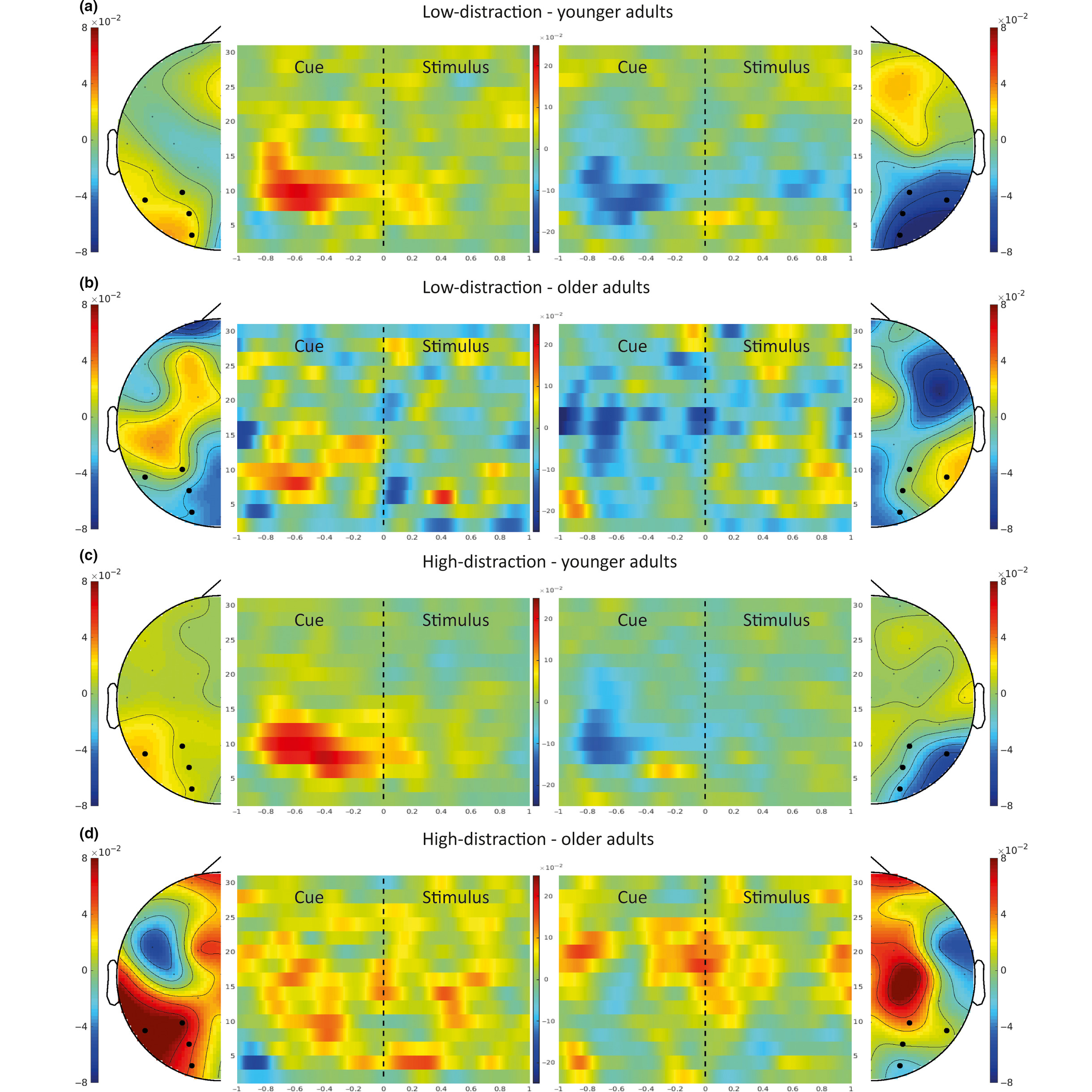 Alpha modulation in younger and older adults during distracted encodingSyanah C Wynn, Erika Nyhus, and Ole JensenEuropean Journal of Neuroscience, 2020
Alpha modulation in younger and older adults during distracted encodingSyanah C Wynn, Erika Nyhus, and Ole JensenEuropean Journal of Neuroscience, 2020To successfully encode information into long-term memory, we need top-down control to focus our attention on target stimuli. This attentional focus is achieved by the modulation of sensory neuronal excitability through alpha power. Failure to modulate alpha power and to inhibit distracting information has been reported in older adults during attention and working memory tasks. Given that alpha power during encoding can predict subsequent memory performance, aberrant oscillatory modulations might play a role in age-related memory deficits. However, it is unknown whether there are age-related differences in memory performance or alpha modulation when encoding targets with distraction. Here we show that both older and younger adults are able to encode targets paired with distractors and that the level of alpha power modulation during encoding predicted recognition success. Even though older adults showed signs of higher distractibility, this did not harm their episodic memory for target information. Also, we demonstrate that older adults only modulated alpha power during high distraction, both by enhancing target processing and inhibiting distractor processing. These results indicate that both younger and older adults are able to employ the same inhibitory control mechanisms successfully, but that older adults fail to call upon these when distraction is minimal. The findings of this study give us more insight into the mechanisms involved in memory encoding across the lifespan.
-
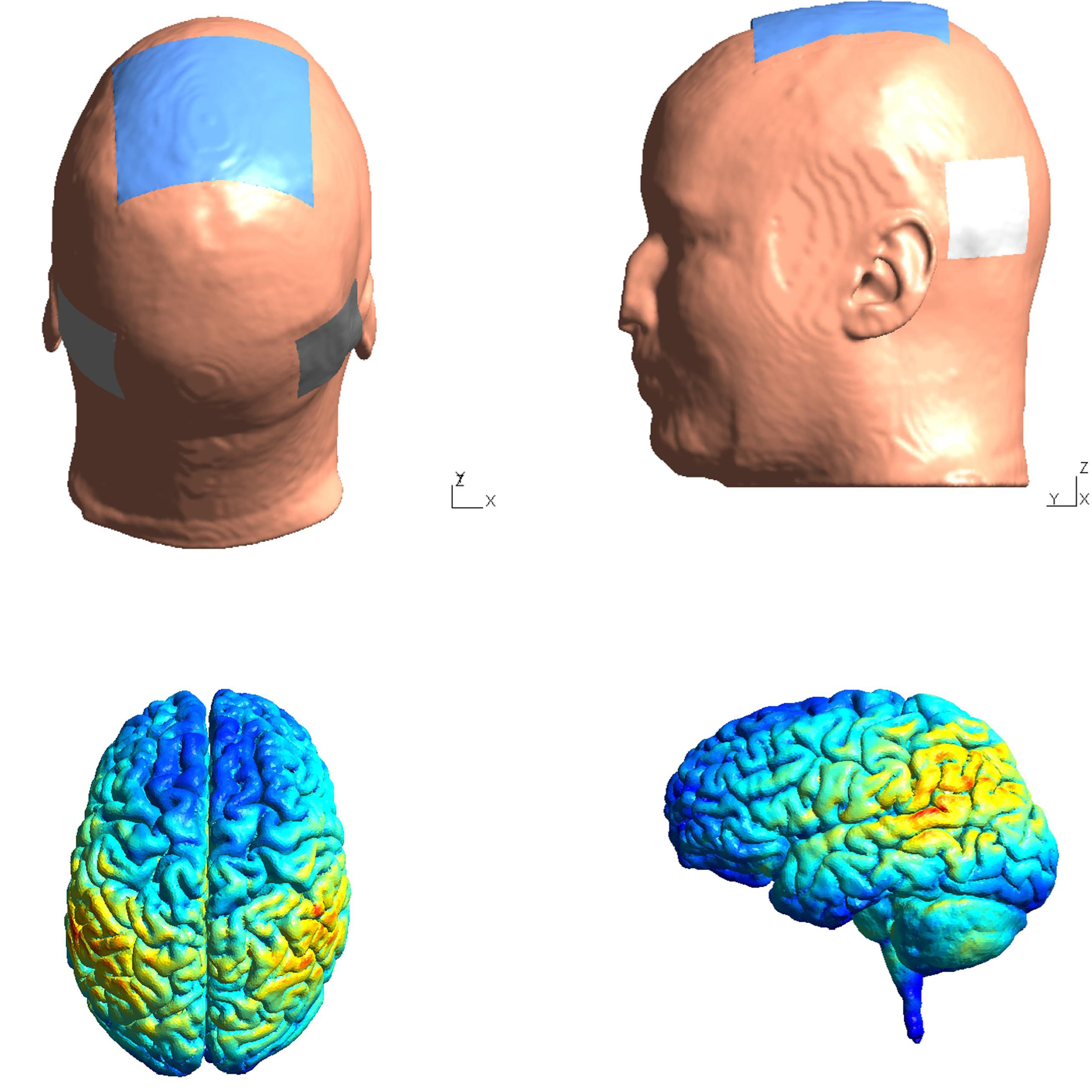 Effects of parietal exogenous oscillatory field potentials on subjectively perceived memory confidenceSyanah C Wynn, Roy PC Kessels, and Dennis JLG SchutterNeurobiology of Learning and Memory, 2020
Effects of parietal exogenous oscillatory field potentials on subjectively perceived memory confidenceSyanah C Wynn, Roy PC Kessels, and Dennis JLG SchutterNeurobiology of Learning and Memory, 2020Previous research suggests involvement of parietal theta (3–7 Hz) power in subjectively perceived memory confidence during retrieval. To obtain further insights into the role of parietal theta activity during retrieval in processes associated with performance and confidence, fifty-four healthy volunteers performed a recognition memory task in a within-subject sham controlled transcranial alternating current stimulation (tACS) study. Participants encoded a subset of words at specific on-screen locations. During the retrieval phase accuracy and subjectively perceived confidence on item and source memory were evaluated while administering exogenous alternating field potentials. Results showed that 3.5 Hz tACS decreased subjectively perceived memory confidence as compared to sham and 8 Hz tACS. No tACS effects were found on accuracy regarding item and source memory. Our findings suggest that theta activity in the parietal cortex is implicated in subjectively perceived confidence in word recognition.
-
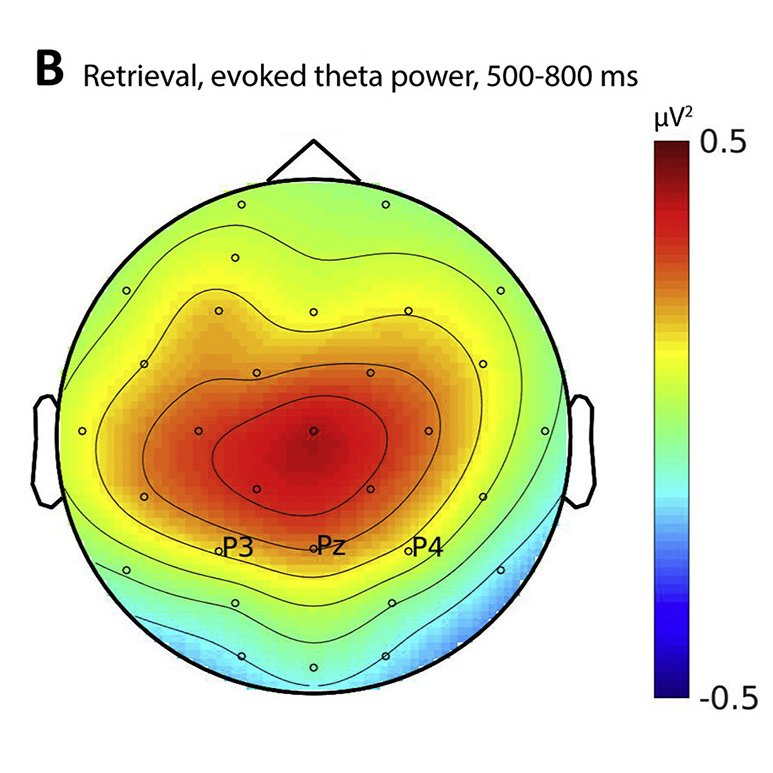 Electrocortical indices of subjectively perceived confidence in episodic memorySyanah C Wynn, Roy PC Kessels, and Dennis JLG SchutterInternational Journal of Psychophysiology, 2020
Electrocortical indices of subjectively perceived confidence in episodic memorySyanah C Wynn, Roy PC Kessels, and Dennis JLG SchutterInternational Journal of Psychophysiology, 2020Electrophysiological studies on recognition memory have identified several brain signals that are associated with subjective perceived confidence. However, the extent these brain signals reflect a generic process and are independent of the type of information recognized remains an open question. To address this issue, twenty-seven healthy volunteers performed an episodic memory task while their electro-encephalogram (EEG) was recorded. Participants encoded a set of abstract pictures, and subsequently rated their confidence on recognition decisions. Similar to results reported in previous studies using concrete words, we found retrieval-related theta power, FN400 and late positive component (LPC) effects. In contrast to previous studies using verbal material, a subsequent memory effect for encoding-related evoked theta power, sensitive to subjectively perceived memory confidence, was observed. Our findings suggest that brain signals that are associated with subjectively perceived confidence reflect specific encoding, but generic retrieval processes.
2019
-
 Cerebellar transcranial direct current stimulation improves reactive response inhibition in healthy volunteersSyanah C Wynn, Josi MA Driessen, Jeffrey C Glennon, Inti A Brazil, and Dennis JLG SchutterThe Cerebellum, 2019
Cerebellar transcranial direct current stimulation improves reactive response inhibition in healthy volunteersSyanah C Wynn, Josi MA Driessen, Jeffrey C Glennon, Inti A Brazil, and Dennis JLG SchutterThe Cerebellum, 2019Involvement of the cerebellum to non-motor related aspects of behavior is becoming increasingly clear. The aim of this study was to investigate the role of the cerebellum in reactive and proactive behavioral control and interference. In a double-blind controlled within-subject design, 26 healthy volunteers underwent real and sham cerebellar transcranial direct current stimulation (tDCS) while performing a go/no-go task and a delay discounting task. Results showed that the number of go/no-go commission errors was significantly lower during real as compared with sham cerebellar tDCS. No effects of tDCS were observed on delay discounting. Our findings provide further behavioral support for the involvement of the cerebellum in fast neural processes associated with response inhibition.
-
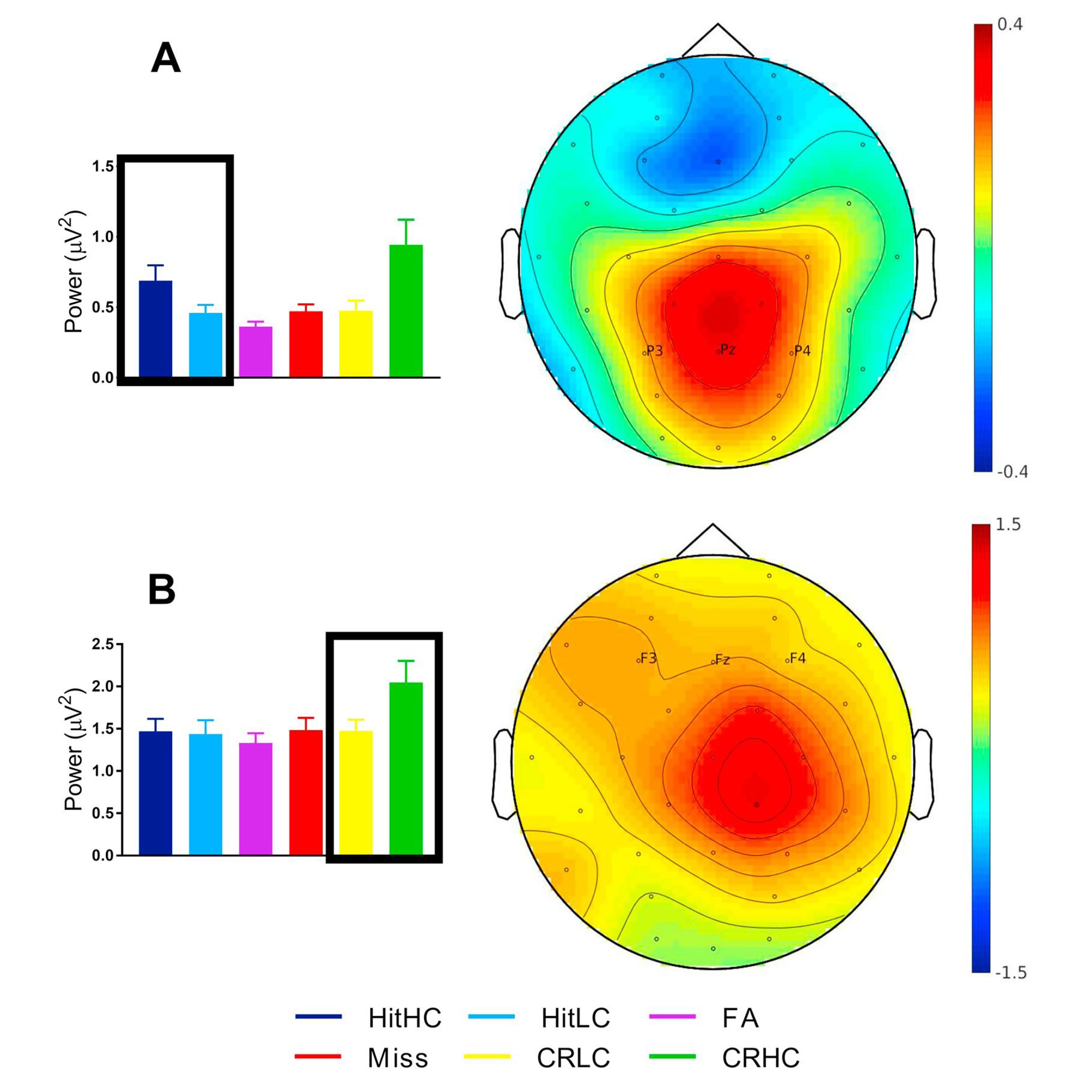 The electrophysiology of subjectively perceived memory confidence in relation to recollection and familiaritySyanah C Wynn, Sander M Daselaar, Roy PC Kessels, and Dennis JLG SchutterBrain and Cognition, 2019
The electrophysiology of subjectively perceived memory confidence in relation to recollection and familiaritySyanah C Wynn, Sander M Daselaar, Roy PC Kessels, and Dennis JLG SchutterBrain and Cognition, 2019Subjectively perceived confidence is critically involved in distinguishing recollection from familiarity in episodic memory retrieval. However, the extent to which recollection and familiarity share similar electrophysiological processes associated with subjectively perceived memory confidence remains an open question. In addition, the role of memory encoding in subjectively perceived confidence during retrieval has not yet been investigated. To address these issues, an EEG study was performed in thirty healthy volunteers. During a memory task, participants encoded a subset of words while rating the words on pleasantness. Memory recognition and subjectively perceived confidence concerning these ‘old’ and additional ‘new’ words was tested. Results showed that during retrieval, correctly classifying an old item with high subjectively perceived confidence was associated with a parietal ERP and parietal theta power, while frontal theta activity was related to high-confident novelty processing. During the memory encoding phase, a parietal ERP and frontal theta oscillations were related to subsequent subjectively perceived memory confidence. Our findings provide the first evidence that subjectively perceived memory confidence is associated with distinct electrophysiological correlates during both memory encoding and retrieval.
2018
-
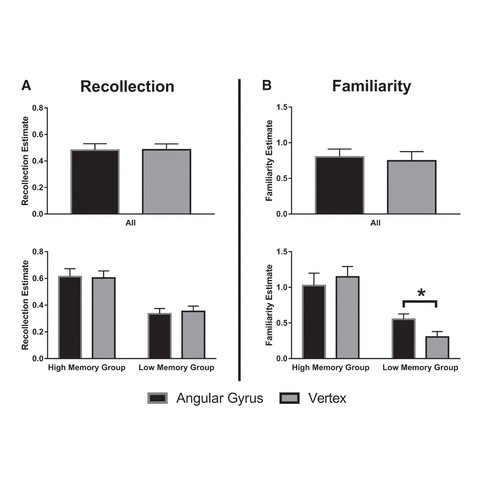 The posterior parietal cortex and subjectively perceived confidence during memory retrievalSyanah C Wynn, Marc PH Hendriks, Sander M Daselaar, Roy PC Kessels, and Dennis JLG SchutterLearning & Memory, 2018
The posterior parietal cortex and subjectively perceived confidence during memory retrievalSyanah C Wynn, Marc PH Hendriks, Sander M Daselaar, Roy PC Kessels, and Dennis JLG SchutterLearning & Memory, 2018Functional neuroimaging studies suggest a role for the left angular gyrus (AG) in processes related to memory recognition. However, results of neuropsychological and transcranial magnetic stimulation (TMS) studies have been inconclusive regarding the specific contribution of the AG in recollection, familiarity, and the subjective experience of memory. To obtain further insight into this issue, 20 healthy right-handed volunteers performed a memory task in a single-blind within-subject controlled TMS study. Neuronavigated inhibitory repetitive TMS (rTMS) was applied over the left AG and the vertex in a randomized and counterbalanced order. Prior to rTMS participants were presented with a list of words. After rTMS participants were shown a second list of words and instructed to indicate if the word was already shown prior to rTMS (“old”) or was presented for the first time (“new”). In addition, subjectively perceived memory confidence was assessed. Results showed that recollection was unaffected following inhibitory left AG rTMS. In contrast, rTMS over the left AG improved both familiarity and the subjectively perceived confidence of participants that demonstrated low baseline memory recognition. Our study highlights the importance of taking into account individual differences in experimental designs involving noninvasive brain stimulation.
2014
-
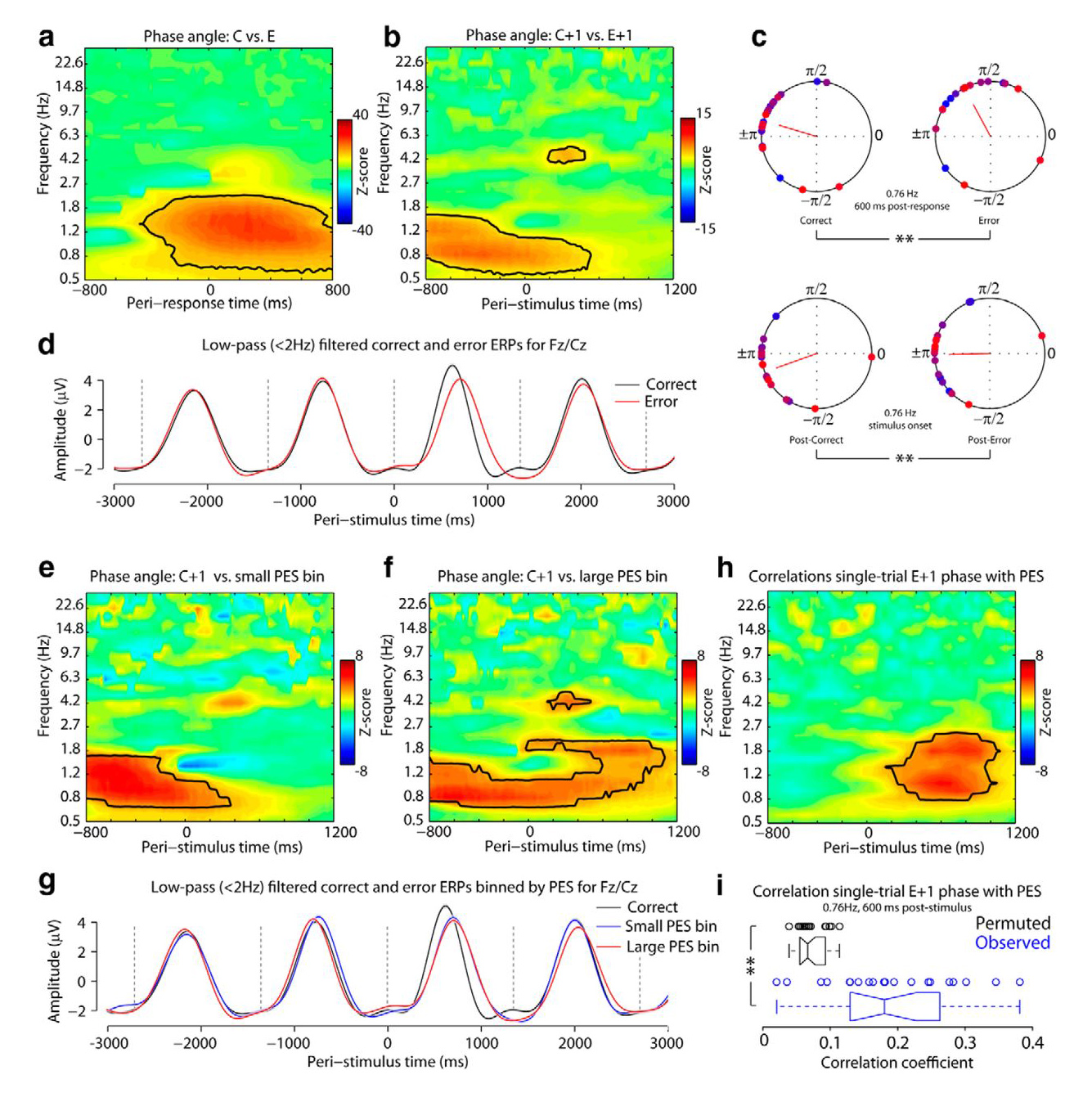 Post-error slowing as a consequence of disturbed low-frequency oscillatory phase entrainmentRuud L Brink, Syanah C Wynn, and Sander NieuwenhuisJournal of Neuroscience, 2014
Post-error slowing as a consequence of disturbed low-frequency oscillatory phase entrainmentRuud L Brink, Syanah C Wynn, and Sander NieuwenhuisJournal of Neuroscience, 2014A common finding across many reaction time tasks is that people slow down on trials following errors, a phenomenon known as post-error slowing. In the present study, we tested a novel hypothesis about the neural mechanism underlying post-error slowing. Recent research has shown that when task-relevant stimuli occur in a rhythmic stream, neuronal oscillations entrain to the task structure, thereby enhancing reaction speed. We hypothesized that under such circumstances post-error slowing results from an error-induced disturbance of this endogenous brain rhythm. To test this hypothesis, we measured oscillatory EEG dynamics while human subjects performed a demanding discrimination task under time pressure. We found that low-frequency neuronal oscillations entrained to the stimulus presentation rhythm, and that the low-frequency phase at stimulus onset predicted the speed of responding. Importantly, we found that this entrainment was disrupted following errors, and that the degree of phase disturbance was closely related to the degree of post-error slowing on the subsequent trial. These results describe a new mechanism underlying behavioral changes following errors.